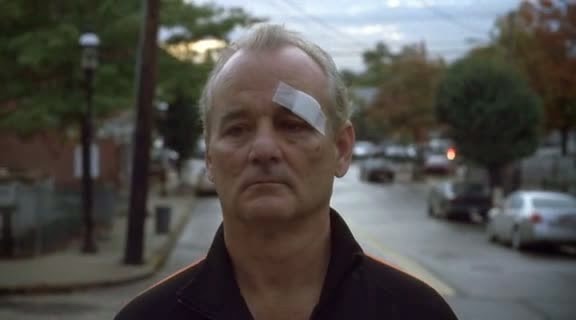An aging womanizer receives an anonymous letter from a child he didn't know he had and promptly sets out to visit his former lovers.
This is the perfect vehicle for Murray's dead-pan performance. The film starts out as a Murray being the straight man in a world populated by his more-or-less-crazy exes. Which made me root for his character to reach the goal of his mission. And the way the film is told it really seems that he manages to reach it. But a mixture of the character's personality and the circumstances (and, obviously, a sense of reality that sets in quite suddenly) render his attempt futile.
In my opinion, the way Murray's character is constructed is by far the most exciting part of the film, although I enjoyed the film altogether very much. Don Johnston (!) is in his late 40s and seems to have made enough money in "computers" that he is not really concerned about work anymore. Quite possibly he has had a long row of lovers he could "afford" and quite obviously seems to have been dumped by pretty much all of them.
He seems completely incapable of displaying warmth and empathy towards his former companions and emotionally inaccessible to those of them who try to approach him. His neighbour Winston (beautifully played by right) works hard to get Johnston's motivation up, to the point where he takes over the mission completely and gets tickets and maps for his friend. The laconic Murray just wanders from waypoint to waypoint - it's only when he hopes his mission accomplished that he is able to show some enthusiasm.
The final shot of the film is a very impressive one: The camera suddenly starts to circle around Johnston. There's a very technical aspect: Murray turns 180 degrees counter-clockwise, while the camera goes around 360 degrees. The shot then lingers on for something like 10 seconds, before it is cut to the credits. Not much happening otherwise, nevertheless, it is an amazingly effective shot and for some weird reason the one that stuck with the most, long after the film was over.
This is the perfect vehicle for Murray's dead-pan performance. The film starts out as a Murray being the straight man in a world populated by his more-or-less-crazy exes. Which made me root for his character to reach the goal of his mission. And the way the film is told it really seems that he manages to reach it. But a mixture of the character's personality and the circumstances (and, obviously, a sense of reality that sets in quite suddenly) render his attempt futile.
 |
| Pell James: how to be impressive in 20 seconds screen-time |
He seems completely incapable of displaying warmth and empathy towards his former companions and emotionally inaccessible to those of them who try to approach him. His neighbour Winston (beautifully played by right) works hard to get Johnston's motivation up, to the point where he takes over the mission completely and gets tickets and maps for his friend. The laconic Murray just wanders from waypoint to waypoint - it's only when he hopes his mission accomplished that he is able to show some enthusiasm.
The final shot of the film is a very impressive one: The camera suddenly starts to circle around Johnston. There's a very technical aspect: Murray turns 180 degrees counter-clockwise, while the camera goes around 360 degrees. The shot then lingers on for something like 10 seconds, before it is cut to the credits. Not much happening otherwise, nevertheless, it is an amazingly effective shot and for some weird reason the one that stuck with the most, long after the film was over.






Kommentare